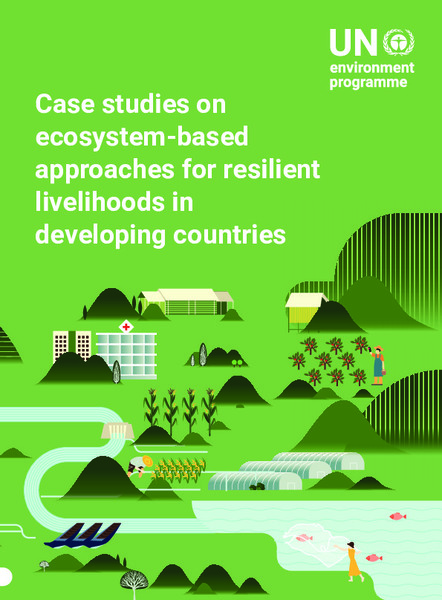Case Studies on Ecosystem-based Approaches for Resilient Livelihoods in Developing Countries

Date
2022Author
United Nations Environment Programme
Citation Tool
Bibliographic Managers
RT Generic T1 Case Studies on Ecosystem-based Approaches for Resilient Livelihoods in Developing Countries A1 United Nations Environment Programme YR 2022 LK https://wedocs.unep.org/20.500.11822/42924 PB AB TY - GEN T1 - Case Studies on Ecosystem-based Approaches for Resilient Livelihoods in Developing Countries AU - United Nations Environment Programme Y1 - 2022 UR - https://wedocs.unep.org/20.500.11822/42924 PB - AB - @misc{20.500.11822_42924 author = {United Nations Environment Programme}, title = {Case Studies on Ecosystem-based Approaches for Resilient Livelihoods in Developing Countries}, year = {2022}, abstract = {}, url = {https://wedocs.unep.org/20.500.11822/42924} } @misc{20.500.11822_42924 author = {United Nations Environment Programme}, title = {Case Studies on Ecosystem-based Approaches for Resilient Livelihoods in Developing Countries}, year = {2022}, abstract = {}, url = {https://wedocs.unep.org/20.500.11822/42924} } TY - GEN T1 - Case Studies on Ecosystem-based Approaches for Resilient Livelihoods in Developing Countries AU - United Nations Environment Programme UR - https://wedocs.unep.org/20.500.11822/42924 PB - AB -View/Open
Item Statistics
Display item statisticsMetadata
Show full item recordDescription
The report features 10 case studies representing distinct freshwater, mountain and dryland areas at different sites across Asia and Africa, where local communities solve challenges of environment and livelihoods through ecosystem-based approaches. Taking advantage of data and information mainly collected by means of household surveys at sites, the report showcases a sustainable livelihoods framework revealing the effects of different ecosystem-based approaches on the livelihoods of local communities. Key findings in the report underline the importance of human capital, diversified income activities, and social inclusiveness in linking natural capital to human society to achieve multiple co-benefits. They make a strong argument for greater attention to be paid to enhance the capacity of local people to implement ecosystem-based approaches towards the attainment of our 2030 agenda.
Collections
Document Viewer
To read more, scroll down below.

